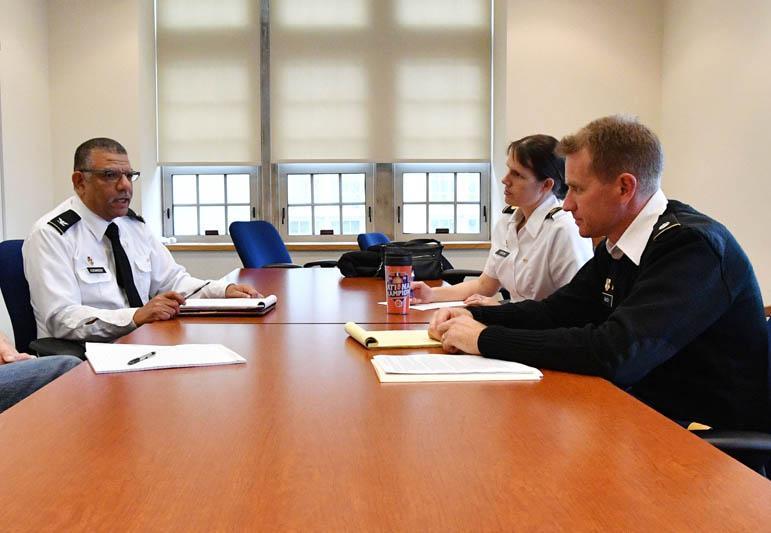Cybersecurity Minor to Launch in the Fall

Maj. Jennifer Gerow and Lt. Col. Spencer Bakich confer with Col. Mohamed Eltoweissy on the cybersecurity minor. – VMI Photo by Kelly Nye.
LEXINGTON, Va., March 24, 2017 – Departments across post are coming together to offer a new minor that should appeal to cadets majoring in a wide variety of disciplines.
VMI’s cybersecurity minor will launch in the fall of 2017, having been approved by the academic board in December 2016. While it’s not the Institute’s first minor involving more than one department – the exercise science minor involves faculty from both biology and physical education – the cybersecurity minor will be unique in that six departments are involved and that the minor is open to any cadet in any major.
Cadets electing to earn the new minor must earn nine academic credits in the core requirements of computer science fundamentals and programming before progressing on to earn 15 elective credits outside their major from pre-approved courses in six departments.
Those electives may be chosen from the departments of computer and information sciences; electrical and computer engineering; economics and business; international studies and political science; English, rhetoric, and humanistic studies; and psychology.
While that may seem an eclectic blend, to Col. Mohamed Eltoweissy, head of the Department of Computer and Information Sciences, it’s just sensible, given the wide-ranging nature of the cybersecurity field.
“The nature of cybersecurity is multidisciplinary,” said Eltoweissy. “You would not be able to solve the many complex issues without having a multidisciplinary approach to it.”
To give cadets as much leeway as possible in learning skill sets from outside their major, the new minor will offer three tracks: technology; policy and management; and social and behavioral studies. Cadets will be required to choose a track outside their major’s area of expertise. For example, a cadet majoring in computer and information sciences would not be allowed to pursue the technical track.
“This was done on purpose, of course, because we want comprehensive coverage of the topic,” Eltoweissy explained.
In addition to classwork, cadets undertaking the minor will be required to complete a practicum, which can take the form of an internship, summer research, or a capstone project. Cadets will be encouraged to work together to complete the practicum requirement, ideally with cadets majoring in other departments.
Working together, Eltoweissy believes, cadets will learn from each other, as each major brings a unique skill set. “You may be faced with a problem that requires a technical solution, but it also may require studying the behavioral aspect of an attacker,” Eltoweissy commented. “The behavioral and technical aspects need to come together in order to solve such problems.”
Agreeing with Eltoweissy about the need to span disciplines was Maj. Jennifer Gerow, assistant professor of economics and business. “We wanted it to be cross-departmental,” she said. “There’s the social aspect of it, besides just the technology. There’s social aspects, there’s political aspects, there’s business aspects, and we need to include those.”
Two classes that Gerow teaches – Management of Information Systems and Web 2.0 for Business – will count toward the minor, as will a third class from that department, Game Theory, taught by Col. Atin Basuchoudhary, professor of economics and business. All three classes, Gerow noted, touch on cybersecurity in one form or another.
“It’s more than just the technology,” she commented.
Gerow noted that employers of all types will likely see the cybersecurity minor as a huge plus. “For getting a job, it’s awesome,” she said. “Whether you’re commissioning or going into industry, it’s applicable.”
Jobs in cybersecurity are currently going unfilled, Eltoweissy stated, with as many as 36,000 positions in that field vacant right now in Virginia alone. Worldwide, the worker shortage in cybersecurity is projected to be anywhere from 1.5 million to 2 million by 2019.
“We have a great opportunity here,” said Eltoweissy. “VMI needs to take the lead in cybersecurity, given that we have the comprehensive preparation in academics and character.”
- Mary Price
-VMI-
.svg)
.png)